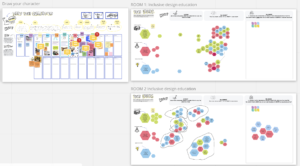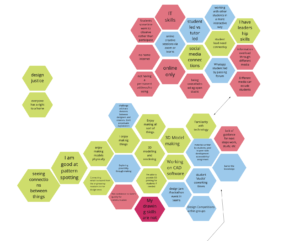How can we shape an inclusive design education that is responsive to the diversity of students’ needs, interests and professional and personal context? This was a question we started exploring yesterday in an online workshop with students from our current Design and Innovation qualification. We feel so fortunate to have had the opportunity to hear a little bit about the personal stories of students and their aspirations for the future of design education at the OU. They were all wonderfully reflexive, open and with deep insights to share.
We used a Miro whiteboard to facilitate the conversation and we were a bit apprehensive at first, as from our experience using this technology we know it requires a bit of familiarisation, and can sometimes exclude people who may not have good access to internet, or may have visual or manual dexterity disabilities.

We started the discussion with an ice-breaker activity which allowed everyone to say something about the things they enjoy, or things that they recently discovered about themselves, their skills, their life. We talked about a wide variety of things, from technology, making, cooking and storytelling, to birdsong, to our connections with places, and even new business ventures. We talked about how things that may be perceived as limits to our physical or cognitive capabilities, are in many ways also tools for discovering new skills, interests and capabilities – they define us and we define them.
Starting from that positive perspective of our skills, knowledge and characteristics, we went on to explore ideas about inclusive design education and the things that we can do differently. Participants used hexagonal colour coded sticky notes to record their thoughts about their assets (the things they have or are important to them), their challenges (the obstacles, or things that make them feel excluded in the context of design education) and their ideas for their future. We then started sharing these thoughts, interrogating them further and connecting and clustering them together. I can positively say that in the 45 minutes we had for this exercise, we discussed many aspects of design, and identified important gaps but also opportunities to enhance student experiences and make design education at the OU more inclusive and more open to diversity.

For example, we talked about opportunities to bring students together both in more formal and more informal ways, e.g. through use of social networks, through the creation of buddy systems, peer assessment, shared resource spaces and student led activities. We talked about participation in live projects and competitions, and about connecting module materials and processes to important issues, like taking care of the environment, supporting people with disabilities, and enabling the expression of different and more marginalised perspectives and cultures. We talked about neurodiversity and cultural diversity and how to create the conditions or environments for everyone to flourish.
At the end of the workshop, we all felt that we were just beginning to scratch the surface of really important issues, but we came away with many creative and constructive suggestions. We hope that we will continue the conversation with students, tutors and external partners to enhance our design offer at the OU. We have recently received significant investment from the University for a new design qualification with broader aspirations to transform not only design education at the OU, but also what role design and designers will play in our world in the future. We are a bit ambitious, but only insofar as this reflects our students’ hopes and expectations!
Written by Katerina Alexiou and Theo Zamenopoulos

Leave a Reply